#The story is very Balkanized
Text
Third OC (Original Character): Marko Stjepan Mitrović/Aiarnāro Elnethīnye

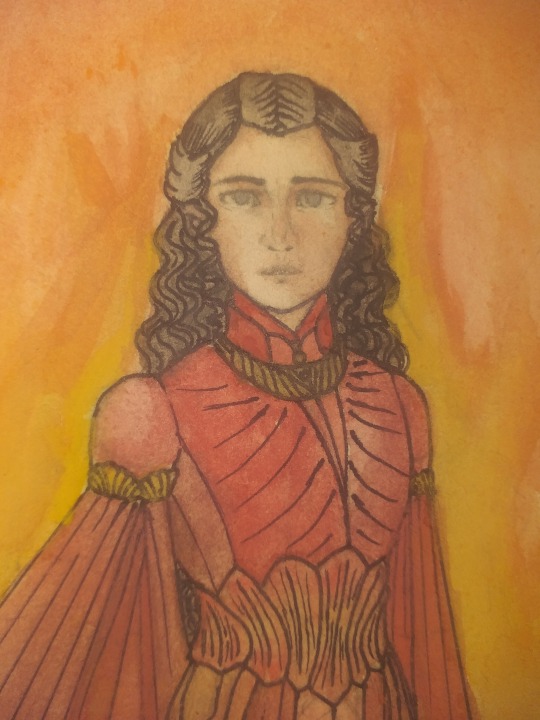
The Red Flames danced upon the sea,
Where lies an unyielding and fierce soul,
Aearnor, his mother-name many knew by.
His eyes were the fury of a thousand suns,
Burning brighter with passion and desire,
Strides through the cities of the deathless darkness.
He was as more seductive as the harlots,
Cunning as the tyrants, fierce as the warriors,
And more handsome as many of mortal men.
Black tresses with silvery white streaks,
Pale skin he has, adorned with the golden hues
Clad in robes of the blood red and pure black.
A Peredhel born with the vampire blood,
Light and shadows he belonged in both,
He's clever with a mind sharp as a blade.
Fairest of all men, his beauty matched Ganymede's
Admired by many, feared by some,
His old soul was burned by the fires of resuscitation.
The Shrewdness of ages in his eyes,
The passion of man in his heart,
And the wholeness of a being in his spirit.
Overview:
Marko Stjepan Mitrović was the youngest twin son of Halatirnë II (Previous OC) by a Human-Vampire Count Šimun Mitrović of Vinkovci and twin brother of Aiardil Alatarāto (Aeardil Galadrod—First OC), the biological son of Lord Hrávahyalmo Altaluimë (Next OC). [Note: Their birth was the result of the real-life rare occurrence called Heteropaternal Superfecundation, which involved the fertilization of two eggs by two sperms from different fathers.] He was the only Peredhel (if not) who had his vampire lineage and the last scion of the last generation of the Mitrović Family since 1999. Marko now appeared in the Elemmírion Series on Wattpad. (Still ongoing)
Description of the artwork: The original form of Aiarnāro/Marko was described as waist-length, raven-haired with silver streaks (Same as his mother Halatirnë II), clad in blood-red robes, his skin was as pale as either alabaster or porcelain. He holds the Elder wand, which was wielded by Albus Dumbledore (Formerly), Lord Voldemort (briefly), and Harry Potter (after the Battle of Hogwarts). The background was supposed to be black and red gradient and a giant red fires/flames behind him.
Names:
His name "Marko Stjepan" was the common Ataressë (Father-name) given by his father Šimun. Aiarnāro (Aearnor/Eärnáro) was his rare Amilessë (Mother-name) means "Sea of Fires/Flames" given by Halatirnë II herself, while his epessë (Aftername) was Undómielo "Evenstar", Elnethīnye "Star of the Evening" or Hesperus "Evening Star".
Bloodline: ½ Elda (Telerin);¼ Human; ¼ Vampire
#books#non canon#tolkien legendarium#wattpad#artwork#wizarding world#poem#reading#i use my black pen for my ultimate sketch step#my oc art#original character#elemmírë#watercolour art#watercolor painting#oc reveal#teleri#tolkien elves#The story is very Balkanized#Elemmírion#balkan#The Balkan Silmarillion#The Balkan Rip-off of the Silm Trash
2 notes
·
View notes
Note
Come on, you know you want to, give us the character bingo for Viktor.
don't mind if i doooo
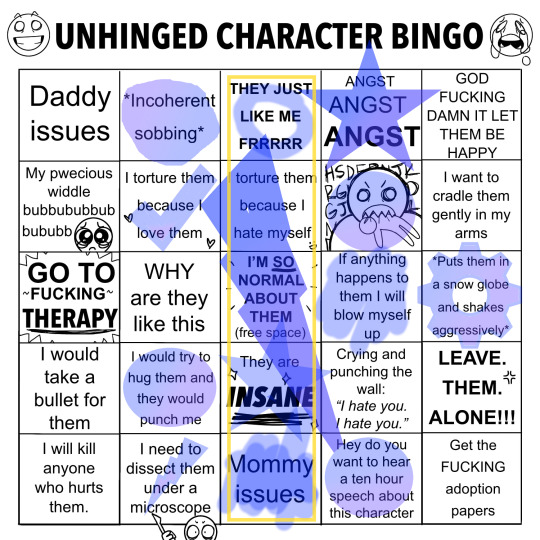
#ask me#okay there's a lot going on here but first things first#viktor has transcended the favorite character tier where I want to protect him or whatever#like yeah he did that shit! I support him but I also don't! the more trouble he gets himself into the happier I'll be!#do you feel me#like one of the things I love most about Viktor is that I feel so much sympathy for the circumstances he's in that are out of his control#but he has so much agency in his own story that everything he's gained and accomplished are because he makes choices#and GETS HIMSELF places#and now the same thing is happening with his BAD choices and I find that just as delightful if not moreso#he is the agent of his own salvation and his own destruction and I will be in the front row seat with popcorn for both or either#so writing him is mostly me studying him under the microscope poking him until he does something untoward it's very fun#I only hesitantly say that Viktor is like me but the Balkan ties and the grumpy-but-kind and obsessive personality#and the strong opinions about a chosen STEM field#are inescapable okay#mommy issues is not circled because I have mommy issues but bc I have convinced myself that Viktor WILL have them#if Nikola Tesla is anything to go by#the jayce-mel-viktor trifecta is ruled by mommy issues and i will stand by that claim#also viktor is more interesting with no therapy - with as little therapy as possible would be my preference#WITH THE EXCEPTION of the lonely genius shit that Singed planted in his head#that is absolutely the lie that Viktor believes that he MUST discard in order to progress as a character and I am excited for it#I genuinely think that Viktor will be happier and more eccentric as [REDACTED] but it won't last#he will hit a VERY LITERAL -if thy right hand offend thee cut it off- situation and then he'll have peace but he won't call it happiness#I can't say that I'd hate anyone who hurt him because that is half of why I'm excited for s2#but I will probably lose it at any scene where he loses to [REDACTED] for rivalry reasons#I genuinely do want to see Mel completely own his ass as [REDACTED] though like can you imagine the banter#and both of them secretly having fun with it
7 notes
·
View notes
Text
“vampires are PROBLEMATIC because they represent the wealthy class and elites--”
to YOU! to me they represent endless fun
#whenever i see sour takes abt vampires 'sucking the lifeblood of the working class' i wanna blow up a building or smth#idk how to tell u this but.#A. vampires are not real#B. they can represent lots of things to different ppl so if they represent the wealthy in one story then they represent the wealthy there.#C. the most famous 'real' balkan vampires were peasants. good bye#D. historically vampires in fiction have represented marginalized communities#specifically lgbt+ people. in both positive and negative ways.#E. NONE OF THIS MATTERS BC VAMPIRES ARENT REAL#u cant get mad at a folkloric figure for being problematic bc they aRENT REAL fgydufgsdgfs#literally yall get so ANGRY abt so many things that DO NOT MATTER im gonna throw up#please please please im begging you to have a conversation w a real normal person#preferably irl and w someone who doesnt engage very much w social media#please im begging#little anya things#yall dont know how to have fun. how to just chill abt smth.#its fine if ur not into vampires its okay u dont have to come up w a reason#i dont like werewolves. its not deep i just dont like them its okay
4 notes
·
View notes
Text
Kimblee's dad: So, why are you driving a coach all by yourself in the middle of the night?
Kimblee's mom, transporting illegal goods for the mob that's blackmailing her: *sweating* Don't look too much into it.
Kimblee's dad: *nodding* Ok! *hops onto the couch with her* I'm coming along, then, to make sure you don't get hurt. It's always less suspicious when a man drives. We can say we're a married couple if anyone asks! :D
Kimblee's mom: :1 You never miss an opportunity to insinuate we're married, do you? Pretty desperate, huh? Did your folks marry young and now you think you need to get married without getting a girl out on a date first? I mean, that sounds like a psychological problem to me.
Kimblee's dad: Don't look too much into it.
Kimblee's mom: No, no. Let's talk about it. Defend your reasoning.
Kimblee's dad: I didn't know you liked to debate? :D
Kimblee's mom, exasparated: You know NOTHING about me!
Kimblee's dad: I know my whole world lights up when I watch you swinging that music baton during the concerts you perform at.
Kimblee's mom: oK. Fiend. *turns away from him* *blushing* *angry about it*
Kimblee's dad: Just...what are we transporting?
Kimblee's mom: Not weapons or drugs.
Kimblee's dad: That's such a small consolation. You know if you married me I could tell my dad to put you up as the main conductor in the West City Concert Hall. You wouldn't need to do these odd jobs to keep your job in Central City.
Kimblee's mom: My dad this, my dad that - can YOU do anything?
Kimblee's dad: I can drive a couch a hell of a lot better than you.
Kimblee's mom: *speechless pointing at the dad* Shut up and drive.
#they're very bickery#bicker bicker bicker#proper balkan couple lmao#metallic crimson#lmao am i rly gonna write a prequel side story abt these two lmaoooo i am arent i
5 notes
·
View notes
Text
Since there’s a bit of a hiatus in Dracula Daily right now, I thought I’d take the opportunity to ramble about what I know of vampiric folklore and history in Europe because I cannot contain my infodump and it’s actually really interesting.
Painting it in very broad strokes, the earliest folkloric creature we would recognize as a vampire was acknowledged in Europe in the 1100s and earlier as a human corpse that physically rose from their grave and returned to their former home/village to drink blood. (A 12th-century English text, The Life and Miracles of St. Modwenna, mentions two examples of this type of vampire.) These vampires’ victims did not become vampires as well, but sickened and died, usually from wasting diseases. What caused the original person to become a vampire was variable, but usually involved being, just, an absolute jerk when they were alive, or an increasingly convoluted series of ways in which they attracted bad luck/evil while they lived, after they died, or as they were buried.
This is where the traditions of stuffing a stone in the potential vampire’s mouth, decapitating them and putting the head in the grave between their knees, burying them facedown, cutting off their hands or feet, burying them in a too-small grave, piling stones atop the grave, or burying them with broken legs came from. All of these are regional or historical variations on ways to quite literally prevent the presumed vampire from digging their way out of the grave and causing trouble: an “And stay down there!” maneuver that we’ll see survive into modern pop culture in the form of a stake through the heart.
This was the predominant form of vampirism up until roughly the 1700s: someone nasty in the village died, and after a while, would start reappearing to their family or loved ones at night, slowly draining their lives away as they fell to a wasting disease like tuberculosis or leprosy. Once the villagers caught on, they would exhume the body, find it suspiciously preserved and with blood trickling from its mouth, and then take steps to neutralize the vampiric threat by beheading, staking it through the heart to literally pin it in the grave, stuff a stone in its mouth, or a combination of all three.
(You may have heard of the Venetian mass-burial plague pit an archeological team discovered: one of the skeletons had a brick shoved in her mouth. She was the only body treated in such a way, implying that she was thought to have been a vampire: hypothetically even the vampire that caused this local upswing of the plague.)
A cultural shift happened in the 18th century, however, when the Austro-Hungarian Empire gained territory in Serbia and other portions of the Balkans. Since they were neighbors with the Ottoman Empire, the Austro-Hungarians kept a heavy military presence in these new territories, and the emperor of the time (Charles VI, I believe) asked the occupying forces to collect reports on the local customs and folklore and send them back.
A number of the reports they sent back included vampire stories.
Now, this was the Age of Enlightenment: many countries were pulling away from old superstitions and following the new methods of science. Belief in vampirism was a rural thing, and widespread plague situations had faded enough that they really weren’t relevant anymore and had fallen out of a lot of people’s memory.
But the thing was... science was still new, and this whole vampirism thing sounded just plausible enough to be extremely interesting. The Austro-Hungarians sent all sorts of scientists, doctors, and clergy members to collect and dissect and discuss these stories, and for a short spate of time vampirism was the hot new discussion topic in esoteric circles. And for then and a while after, if you wanted case studies, debates, and just about any reference material on vampires, you knew you’d find it in Austro-Hungary’s library.
Eventually the scientific community all concluded that this vampirism thing was just silly peasants not understanding the process of decay, but the arts crowd -particularly the Sturm und Drang folks in Germany- remained very interested in this exotic new creature steeped in mystery and death. Sturm und Drang translates to “storm and stress” and if I had to describe their style in modern terms, I would say (roughly, and with affection) “a love of edgy tragedies.”
There were a number of poems and works spawned from this flurry of interest, but this Austrian version of the vampire still shared a common theme: more like a revenant than anything else, coming for their loved ones first, and a lot of their horror was tied up in how blasphemous and unChristian their very existence was. Less emphasis was placed on getting rid of the vampire and more was placed on the artistic allure of vengeance from beyond the grave and the vampire’s inherent exotic mysticism and threat.
Stoker, in fact, directly references an example of this in Dracula! On May 5th, when Dracula’s telling the coach driver that he knew they were trying to get Jonathan out of there before he showed up, because he himself drove fast enough to intercept them, one of the other passengers whispers to his friend “Denn die Todten reiten schnell,” which translates roughly to “For the dead ride fast,” a quote from Burger’s Lenore.
Lenore is a poem about a young woman whose fiancé died in the Seven Years’ War (connection with Austro-Hungary). In her despair, she curses god (old-school invitation for vampirism), and the following night, her lover knocks on her door to take her on horseback to their marriage bed (vampires attack their loved ones first). He takes her on an increasingly terrifying ride through the night, prompting the above quote, which ends in a graveyard, where he is revealed to be a skeleton and Lenore dies.
Lenore was written in 1774, and although William is not technically a vampire, the poem is an example of the old-school vampire type. The vampire is a physical reanimated corpse that does not create more of its kind, but causes the people around them to die/waste away, and attacks their loved ones before anyone else. The transition to what we finally would recognize as a modern vampire started with Carmilla and was solidified in Dracula.
Written in 1872, Carmilla is a blending of both old and modern vampiric tropes. It uses the then-expected setting of the Austrian Empire, all of the titular vampire’s victims wasted away and died rather than rising as vampires themselves, and Carmilla’s coffin was filled with blood when she was unearthed. However, she was also able to shapeshift into a cat and walk through walls -no longer just a revenant- and she could walk around during the day without harm. She also does not target the people she knew and loved in life first: Carmilla is a vampire centuries old and her current victims are chosen indiscriminately. The vampire as a folkloric creature was evolving.
And, side note, while it was used partially as a narrative device to show how evil and unnatural Carmilla was, she was also gay. Gay as fuck. People who lost their shit at
“Then the Count turned, after looking at my face attentively, and said in a soft whisper: ��Yes, I too can love’”
will go absolutely mental at Laura going
“It was like the ardour of a lover; it embarrassed me; it was hateful and yet overpowering; and with gloating eyes she drew me to her, and her hot lips travelled along my cheek in kisses; and she would whisper, almost in sobs, ‘You are mine, you shall be mine, and you and I are one for ever.’"
Anyway. Queerness is baked into the concept of the modern vampire from the very beginning, what of it.
With Carmilla as the springboard, though, Stoker was free to finally create Dracula, which was essentially the turning point between modern and archaic vampire depictions. He took all of the old stuff and reworked, revamped (heh), or added to it to get the foundation of the stereotypical vampire we know today.
He shifted the geographic vampire hotspot further over from Austria-Hungary, landing it in neighboring Transylvania. Dracula’s victims weaken and die and seem to be inflicted with a strange wasting disease, but can also turn into vampires themselves. Driving a stake through his heart and cutting off his head is no longer an attempt to pin him in his grave and keep him from rising, but merely to destroy him. He was dead, yes, and very unholy, but he also had powers beyond merely being a risen corpse, and his power set became the standard for future vampire media.
Hence, Dracula becomes the foundation for the modern concept of a vampire, which is why pop culture usually treats it as the beginning point of vampirism in general.
812 notes
·
View notes
Text
So this podcast has a lot of topics and stuff to think about (cons of fame, Bojan's panic attack, Gregor situation, what success means for them, relationship with the fans and their own friendship, how will experiences from this year affect their new music, tour life, social media, support systems and staying down to Earth, state of the world etc.) and it gets very serious and kinda heavy at times actually. I'm not getting into retelling much because jokeroutsubs will probably work on it like crazy, except:
1. Timeline for 2024
As we know, they're moving to London next week, for 2 months. Then comes the European tour, a week at home for the holidays and back to UK for the last part of the tour. Then they're spending a month in Germany to record the album and then they have a big concert abroad which is the most special for them and they believe they'll be able to announce it soon but are still not allowed to talk about it (I am so curious!!). After that, a festival season mainly in the Balkans.
2. The new single
They said it will be out in February and they don't know who'll record the music video. It is apparently a 4 minute long story; ballad in the songwriting sense, but arranged in a way that it doesn't seem so? Bojan said it was like therapy for him and all of them including Žare are really satisfied and excited. And Nace said the first three women who heard it, cried. So good luck to us.
#joker out#kind of an emotional roller coaster this one#definitely emotionally draining for me#but very interesting#and would've been great to hear jan's opinions if he wasn't sick
159 notes
·
View notes
Text
dylan blue — rafe cameron x reader
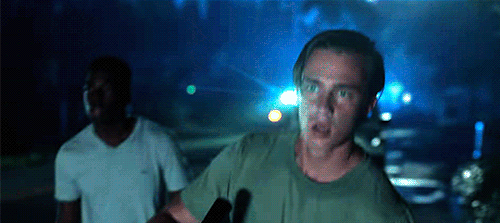
the muse that was here
has awoken my wild side, i fear
not even weed calms me down, it's true
while my entire bed smells like dylan blue
MINORS DNI!
“that's it, so fucking gorgeous,” he didn't know if he'd ever seen a girl as gorgeous as you. you were his muse, one that brought out his wildest side in the best way possible. “my gorgeous girl.” he took a drag of the joint, placed neatly between his thumb and index finger, but not even the drugs could help him keep his cool around you. not while he was drowning in your scent, him and the bed beneath your feet, drowning in the scent of dylan blue.
he bit back a grunt as he inhaled, sweet noises passing your lips as your bare hips trailed alongside his bare pelvis, your weight sinking onto his fat, thick cock once more. his hands trailed down your sides, playing with the fat around your hips as he pressed you down onto his cock. he had never seen a waist like yours, eyes glued to the way you took your bra off, letting it fall to the floor as you bounced on his dick, your walls taking him in so nicely. the sound of the blues bounced off the walls as you leaned forward, his thrusts still pushing past your dripping pussy as he pressed the joint to your lips. your eyes fluttered as you inhaled, a soft moan following.
rafe was mesmerized by you. if he were to spend three-hundred nights awake, he wouldn't complain if it meant he could spend them with you. each stolen glance, each second of passing tension—he swore he had found out how artists felt. if he was as gifted in art as those so-called artists, you'd be his first painting. he'd put you in a frame, knowing it would never be “just a picture”. you could never be just a picture. he was never good at giving himself—not to anybody, until he met you. he knew how badly he needed to have you. shit, there wasn't a museum in the world he'd give you to.
“need you so fucking bad, rafey,” you whispered, coaxing another hit out of the joint as you trailed kisses down his chest, your bare tits pressed against his skin. he was like putty to you, under your touch. “fuck, i love you.” it was as if he hadn't already seen what a woman is capable of, in the heat of the moment. you twisted his entire world, ridding him of his mistakes, of the poison he spread. with each tremble of your voice, time and space went by, completely forgotten.
“i love you, too,” he moaned. even after it ended, he'd do it again. over and over again. with you, he was both, holy and cursed. you had never encountered an issue with him outside of the bedroom, perhaps the chemistry imbalance, nothing more. nonetheless, you let it last because, while it lasted, nothing else mattered. all that mattered to him was your happiness, in that very moment. he could see just how happy you were, eyes teary and lips glossy. you felt good, you made him feel good.
whether he was with, or without you, he would be an asshole. he was rafe cameron. when these moments passed, he reminded you not to ask for his whereabouts. he'd be with someone else, to whom he'd be a new mistake. despite it all, he knew nothing could come close to you and him. it was a shame, how you knew you couldn't fall in love woth him. everything he loved, he destroyed.
you knew exactly what he was made of. you knew it with every moan, caress, kiss. it lingered in the back of your mind. you knew, despite the heat, there was nothing but an iceberg in his chest. he feared the day you'd come too close—the one where you'd meet him, all of him. he'd remember it as the end, your end.
✧.*
a/n: i let my balkan roots come through with this one lol, so sorry to those of you who don't speak serbian/bosnian/croatian. i took the lyrics from the song and turned them into a one-shot. to those of you in need of an english translation, please click here. if anybody has any song-to-story requests like this, please lmk!! always taking requests!!
#obx#obx imagine#obx rafe#obx fanfiction#obx fic#obx smut#obx x reader#outer banks#outer banks x reader#outer banks angst#outer banks fanfiction#outer banks smut#rafe cameron#rafe smut#rafe cameron x reader#rafe cameron smut#rafe cameron imagine#rafe outer banks#rafe cameron fanfiction#Spotify
112 notes
·
View notes
Text
An interview with Bojan Cvjetićanin and Nace Jordan in Jana magazine, published 10.10.2023. Featuring a very special shoutout! 😁

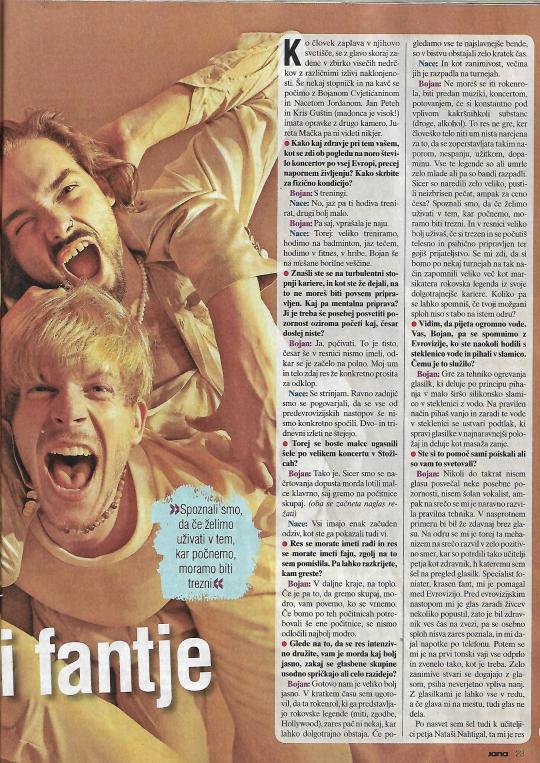
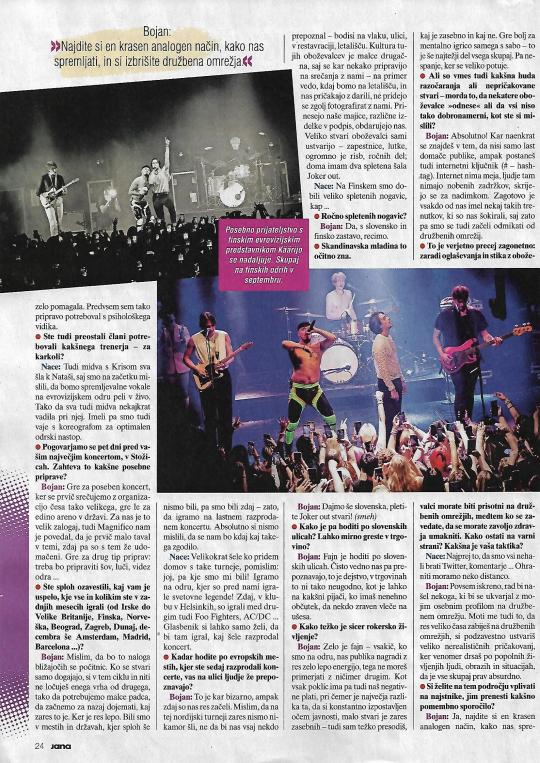
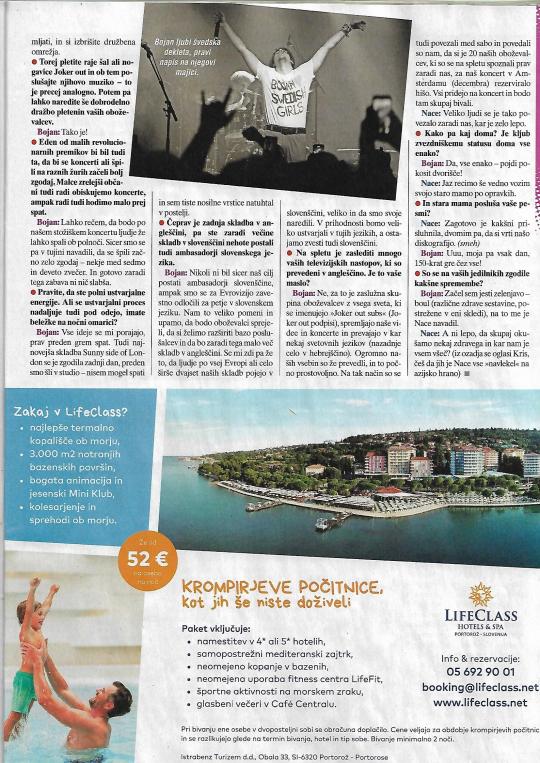
On the couch with Joker Out: about the big changes in their lives
Still good, sober boys
We’ll play this and then we’re off – to switch off
The time we have with them is tightly limited, but that’s appropriate for stars of their kind. They are the most popular musical group right now, and they’ve thoroughly conquered many hearts far beyond both Slovenian and Balkan borders. At sold-out concerts, Finns are swooning because of them, Poles, Serbians, Croatians and Spaniards are fainting, not to mention the girls back home. No one prepared them for this kind of craze, but they’re holding up pretty well – they’re still humble guys with good manners, which can (also) be seen in their polite greeting and relaxed chatting in front of their rehearsal space, a comfortable hideaway somewhere between Ljubljana’s warehouses with an unappealing blue door.
Floating into their sanctuary, you almost hit your head on a collection of hanging bras with various affectionate messages written on them. A few more steps, and we plop down on the couch with Bojan Cvjetićanin and Nace Jordan. Jan Peteh and Kris Guštin (damn, he’s tall!) are busy with another camera, and Jure Maček is nowhere to be seen.
How’s your health doing with your (as it seems if you look at the crazy number of concerts all around Europe) pretty exhausting life? How do you take care of your physical fitness?
Bojan: By working out.
Nace: Well, you and I work out, the others only do it a little.
Bojan: Well yeah, she asked us.
Nace: So: we work out a lot, we play badminton, I run, we go to the gym and hike, Bojan also does mixed martial arts.
You’ve found yourselves at a turbulent stage in your career, and like you’ve said before, you cannot be fully prepared for that. What about mental preparation? Do you have to pay extra attention to that or do anything you've never done before?
Bojan: Yes, we have to rest. We haven't had any rest ever since everything became much more intense. My mind and body are now really begging to switch off.
Nace: I agree. Just the other day, we were talking about how we haven’t truly rested since the pre-Eurovision performances. Two- and three-day trips don’t count.
So you’ll only be able to turn off for a bit, after your big concert in Stožice?
Bojan: That’s right. Well, we maybe planned our break a little poorly, because we’re going on a holiday together. (both start laughing loudly)
Nace: Everyone has the same stunned reaction that you did.
You really have to love each other and have a good time together, that’s all I thought. Can you reveal where you’re going?
Bojan: Far away, somewhere warm. As to whether us going together is smart, we’ll tell you when we come back. If we end up needing another holiday after this holiday, then we didn’t make a very wise decision.
Since you really hang out with each other so much, do you perhaps understand any better why some bands get into fatal quarrels or even break up?
Bojan: We definitely understand it a lot more. In a short time, I’ve realised that this rock and roll lifestyle presented to us by rock legends (myths, stories, Hollywood) is truly something that is untenable in the long term. If we look at all the most famous bands, they actually existed for a very short time.
Nace: And, as an interesting fact, most of them broke up while on tour.
Bojan: You can’t do rock and roll and be devoted to your music, concerts, travels, if you’re constantly under the influence of any substances (drugs, alcohol). You really can’t do that, because neither the human body nor the mind are made to withstand this kind of strain, sleeplessness, pleasure, dopamine. All those legends either died young or the bands broke up. Sure, they did a lot, left a permanent mark, but at what cost? We’ve realised that if we want to enjoy what we’re doing, we have to be sober, and you truly enjoy yourself a lot more if you’re sober and feel physically and mentally ready and cultivate friendships. I think that this way, we’ll remember a lot more after a few tours than many rock legends do in their longer careers. How much can you even remember if your brain isn’t even with you on the same stage?
I see that you’re drinking plenty of water, and we remember you, Bojan, from Eurovision, when you were walking around with a bottle of water and blowing into a straw. What was that for?
Bojan: It’s a technique to warm up your vocal chords, based on the principle of blowing into a slightly wider silicone straw in a water bottle. You blow into it, in the correct way and because of the water in the bottle, a negative pressure is created that puts your vocal chords into the most natural position and it works like a massage for them.
Did you discover this for yourself or was it recommended to you?
Bojan: I had never paid special attention to my voice before that, I’m not a trained vocalist, but luckily I naturally developed the correct technique. Otherwise I would’ve lost my voice long ago. So, on the stage, this mechanism luckily developed in a very positive direction for me, which was also confirmed by singing coaches and the doctor I went to for my vocal chords check-up. A phoniatrics specialist, a wonderful guy, helped me during Eurovision. Before the Eurovision performance, my voice gave in a little due to nerves, so I was constantly in contact with a doctor – and we didn’t even really know each other – who gave me advice over the phone. Then, at the first sound check, everything opened up and sounded like it should. It’s really interesting what happens with your voice, it gets incredibly affected by your mental state. Your vocal chords can be perfectly fine, but if your mind is not in the right place, your voice won’t work either.
I also went to get advice from singing coach Nataša Nahtigal, who really helped me a lot. I especially needed that preparation from a psychological point of view.
Did the other band members also need coaches for anything?
Nace: Me and Kris also visited Nataša, because at the beginning we thought that we’d be singing the backing vocals live on the Eurovision stage. So we also practised with her a few times. We also had rehearsals with a choreographer for the optimum stage performance.
We’re having this conversation five days before your biggest concert yet, in Stožice. Does that require any special preparation?
Bojan: It’s a special concert, because it’s the first time we’re encountering the organisation of something this big; it is, after all, the only arena in the country. It’s a lot for us, Magnifico also told us that he was kind of in the dark the first time, but now they’re acclimatised to it. It’s a different type of preparation: we have to prepare the show, the lights, the stage appearance …
Have you even internalised what you’ve managed to do, all the places and the number of people you’ve played to in the past few months (from Ireland to Great Britain, Finland, Norway, Belgrade, Zagreb, Vienna, and now in December, you've got Amsterdam, Madrid, Barcelona …)?
Bojan: I think that will be a task for the upcoming holiday. When things just keep happening, you’re in this cycle and don’t even really differentiate between one peak and another, so we need to come down a bit to start retroactively comprehending what really happened. Because it’s really wonderful. We were in cities and countries we’d never been to, and then we were there – to play our own sold-out concerts. We absolutely never thought anything like that would ever happen to us.
Nace: Often it’s only when I come home from this kind of tour that I think to myself: wow, look at where we were! We’re playing on a stage where world legends had played before us! Now, in the club in Helsinki, Foo Fighters and AC/DC had played there, among others. Any musician would wish to play there, let alone sell out that concert.
When you walk around these European cities where you have sold out your concerts, do people already recognise you on the street?
Bojan: It’s pretty bizarre, but now they’ve really started to. I think that on this Nordic tour there truly wasn’t any place we went to without at least someone recognising us – either on a train, on the street, in a restaurant, at the airport. Foreign fan culture is a little different, as they get prepared to meet us, in a way – for example, they know when we’ll be at the airport, and they wait for us with gifts, they don’t just come to take photos with us. They bring along our merch shirts, various things for us to sign, they give us gifts. Fans make a lot of things on their own – bracelets, dolls, there are a lot of drawings, crafts; I have two knitted Joker Out scarves at home.
Nace: In Finland we got a lot of knitted socks, hats …
Hand-knitted socks?
Bojan: Yes, with a Slovenian and Finnish flag, for example.
The Scandinavian youth are clearly well-versed in that.
Bojan: Let’s go, Slovenian youth, start knitting Joker Out stuff too! (laughter)
And what is it like to walk down the streets of Slovenia? Can you go to the store in peace?
Bojan: It’s nice to walk down the streets of Slovenia, but we truly always get recognised, that’s a fact, it’s not as inconvenient in stores as it can be when you’re out for drinks, when you constantly feel like someone is eavesdropping next to you.
How difficult is the rockstar life?
Bojan: It’s really nice – every time we’re on the stage, the audience rewards us with a really nice energy, you can’t compare that to anything else, but like any profession, ours has negative sides as well, with the biggest difference being that you’re constantly in the public eye. Very few things are truly personal – you also have a hard time judging for yourself what’s private and what’s not. It’s more of a mental game with yourself – that’s the hardest part of it all. As well as not sleeping, because you travel a lot.
Are there any big disappointments or unexpected things – perhaps that some fans get “carried away” or that not everyone is as well-intentioned as you thought?
Bojan: Absolutely! You suddenly find yourself not only belonging to a home crowd, but also becoming an internet hashtag. The internet has no limits, people have no reservations there, they hide behind a nickname. Each of us has definitely had a few of these moments that shocked us, that’s why we’ve started to pull back from social media.
That’s probably pretty tricky: for the sake of advertising and contact with fans, you have to be present on social media, but meanwhile you’re aware that you need to take a step back for the sake of your health. How do you stay on the safe side? What’s your strategy?
Nace: Primarily, we’ve all stopped reading Twitter, the comments … We have to maintain a certain distance.
Bojan: To be completely honest, I’d like to find someone who could handle my personal profile on social media. It also bothers me that you really waste a lot of time on social media and subconsciously create a lot of unrealistic expectations, because you’re constantly swiping through people’s perfect lives, faces and situations, it’s all quite absurd.
Do you want to influence teenagers in this area, to pass any important messages on to them?
Bojan: Yes, find some wonderful analogue way to follow us and delete your social media.
So, knit a Joker Out scarf or socks instead and listen to their music – that’s pretty analogue. Then, you can also do a charity auction of your fans’ knitwear.
Bojan: Exactly!
One small revolutionary move would also be if concerts or gigs at various parties started earlier. Us slightly more mature citizens also like to go to concerts, but we also like to go to bed a little earlier.
Bojan: I can say that after our Stožice concert, people will be able to be asleep by midnight. But actually, when we were abroad, we got used to gigs starting very soon – sometime between seven and nine in the evening – and the party is definitely not any worse because of that.
You say that you’re full of creative energy. Does your creative process continue under the covers too, do you have notebooks on your nightstand?
Bojan: All the ideas come to me just before I go to sleep. The most recent song Sunny Side of London also happened on the last day before we went to the studio – I couldn’t sleep and I came up with those base lyrics while in bed.
Even though your latest song is in English, due to most of your songs being in Slovenian, you’ve unintentionally become ambassadors of the Slovenian language as well.
Bojan: It was never our goal to become ambassadors of the Slovenian language, but we consciously decided to sing in Slovenian at Eurovision. It means a lot to us, and we hope that our fans will accept that we want to widen our listener base and that there will be some more songs in English because of that. I think that people all around Europe or even further singing twenty of our songs in Slovenian is already a lot, and shows that we’ve done our job. In the future, we’ll create in foreign languages a lot, but we’ll also stay loyal to Slovenian.
A lot of your TV appearances can be found translated to English on the internet. Is that your doing?
Bojan: No, the credit for that goes to a group of fans from all around the world called “Joker Out Subs”, who follow our videos and concerts and translate into quite a few global languages (recently even into Hebrew). They’ve already translated a huge amount of our content, and they do it voluntarily. They’ve also connected with each other in that way, and they’ve told us that 20 of our fans, who met online because of us, booked a house together for our concert in Amsterdam (in December). They’re all coming to the concert and they will stay there together.
Nace: A lot of people have connected like that because of us, which is very nice.
What’s it like at home? Is everything the same at home despite your stardom?
Bojan: Yes, it’s all the same – go mow the lawn!
Nace: I, for example, still drive my grandmother around to run her errands.
And your grandmother listens to your songs?
Nace: She’s definitely listened to some, but I doubt that she’s playing our entire discography. (laughter)
Bojan: Oooh, mine plays it every day, she goes through everything 150 times!
Have you made any changes to your menus?
Bojan: I’ve started eating vegetables – bowls (various healthy ingredients, served in one bowl), Nace got me into that.
Nace: Isn’t it nice to savour something together that’s healthy and that we all like? (Kris pipes up from the background, saying that Nace has gotten them all into Asian food.)
Translation of the captions on the photos:
1) The special friendship with Finnish Eurovision representative Käärijä continues. Together on Finnish stages in September.
2) Bojan loves Swedish girls, says the writing on his shirt.
Translation cr: Joker Out Subs
EDIT: to celebrate the JokerOutSubs shout-out, we prepared a giveaway for Tumblr! You can read more aboout it here!
177 notes
·
View notes
Text
There's something I've been meaning to talk about for a while now.
It's the impact of the trans rights movement on the Romani feminist and gay rights movements.
Now, most Romani rights organizations are very disconnected from the Romani masses. They really don't speak for us at all. Most of them get private fundings from the EU and billionaires like Soros (x). That's what leads a lot of Romani feminist groups to supporting the sex trade (x), despite Romani women being among the first victims of sex trafficking in Europe (x).
With the trans rights movement, we've got Romani feminist groups praising Romani men for taking the place of Romani women. Antonella Lerca Duda, a Romanian Romani transwoman, is featured on many Romani feminist posts whose aim is to present empowering Romani women (x) (x). Antonella Lerca Duda is "the first transexual Romani woman to run for mayor in Romania".
German Romani feminist organization RomaniPhen even chose to include his portrait in their post about powerful Romani women - instead of chosing to picture an actual Romani woman (x). Duda also created a "sex work" organization that fights for the decriminalization of prostitution. He's not our sister and he doesn't fight for Romani women. Yet he was even invited to co-write and star in a play from the only female-only Romani theater troup in the world, Giuvlipen, once again taking the job that could have gone to an actual Romani female playwright and to an actual Romani female actress (x).
In Spain, the trans movement is piggybacking on the back of the Romani rights movement. "Trans women" and "Gitanas" are associated in a manner much similar to what the TRA movement is doing in the US by associating "Trans people" and "Black women". Thus Spanish Senator Teresa Ruiz-Sillero recently said that ""Personas LGTBI (en particular trans), inmigrantes, personas gitanas" se considerarán "colectivos vulnerables de atención prioritaria"." ("LGBTI people (trans in particular), immigrants, romani people" will be considered "vulnerable groups to give a priority attention to") (x)
Many tweets from popular TRA Spanish accounts associate Romani women and trans women (I'm only gonna add three examples because this post is already long; you can look up "gitanas + trans" on twitter to judge by yourself):
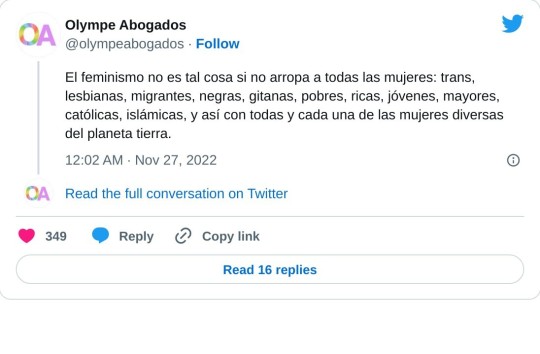

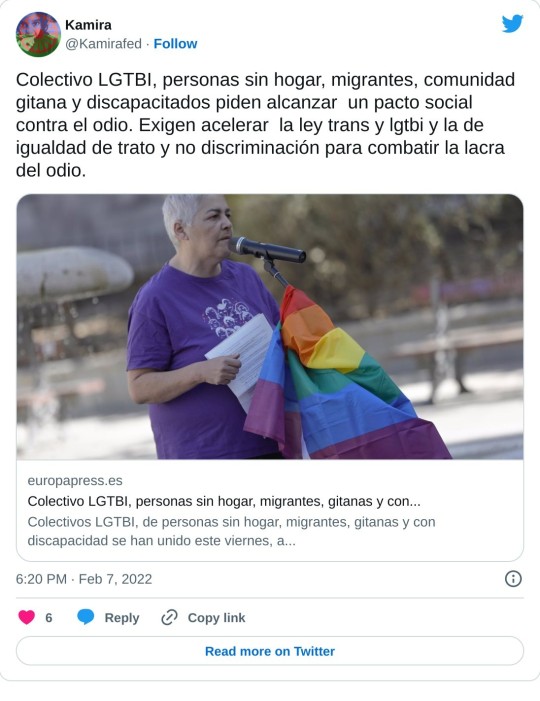
And many Spanish Romani activists and organizations are denouncing TERFs as fascist and fighting for self-ID laws
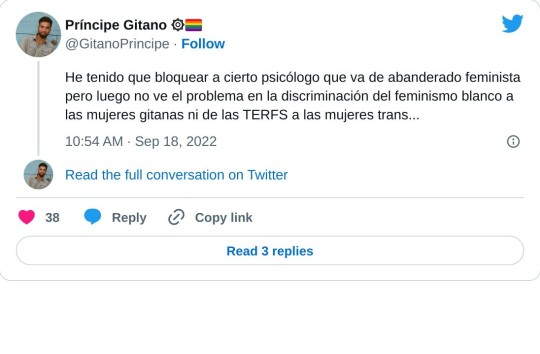

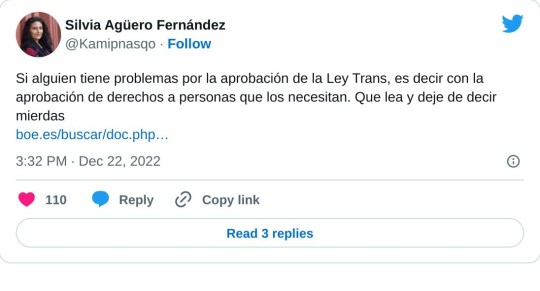
Nevermind the fact that Romani women desperately need sex-segregated spaces considering that Romani women are particularly vulnerable to domestic violence and sexual assaults (x). Nevermind the fact that saying Romani women are not female because we're Romani is inherently racist.
But it's even worse when we think about the Romani gay rights movement. As opposed to many other gay rights movements, the Romani one is very recent. Which means we never got to build up a proper LGB Romani movement detached from "queer theory". We never got a movement only dedicated to SSA Roma, because trans and queer activists are behind all our LGBT groups. Gender rhetoric is deeply embedded in the Romani gay rights movement.
Here's a clip from the ERRC, the largest Romani rights organization in Europe, organizing a workshop on LGBTIQ Roma in the Balkan and in Spain. No lesbian or bi woman is present in this video. There's only one (straight) woman. The person with the longest speaking time is a TIM. This is particularly bad considering Romani orgs have a tendency to ignore Romani women's voices (x).
Ara Art is one of the largest Romani LGBT organization in Europe. On their website, they have interviews with trans Roma. These interviews are deeply sexist and homophobic: here's one in which a gay boy raised in a homophobic family comes out as a trans woman. This story is framed in a positive light.
Romani organizations are repeating the lie that Stonewall was started by "trans women" and are further erasing gay men and lesbians from their own history (x). They publish articles framing LGB Roma's sexuality as "sexual dissidence" (x). By supporting the trans rights movement, orgs like Ververipen, Ara Art and ERRC are supporting the sterilization of LGB Roma. All over Europe, Romani organizations hold conferences to discuss "LGBTIQ rights" (x) and are interviewing Romani TRAs (x), all in order to fight for trans rights (that last link even includes an interview with a biromantic asexual transman lmao). There's no LGB rights movement that exists outside of the gender realm for Roma.


source: Asociacion Gitanas Feministas por la Diversidad (x) and E-Romnja, one of the largest Romani feminist org in Romania (x)
Gadje newspapers are writing articles about "Queer Roma" (x). Gadje academics are writing gender theory thesis about "Queer Roma" (x).
This doesn't help LGB Roma. In my so-called progressive, Western European country, my Romani relatives used to tell me that LGBs were deviant perverts while I was growing up. My local Romani community openly calls for the lynching of LGB Roma. Most European Roma are deeply religious (muslim or christian), sometimes to the point of being fundamentalists. The vast majority of European Roma are working class and don't care about "queer theory".
Yet the associations that are supposed to be fighting for us are reinforcing the idea that LGBs are perverts and that not supporting the homophobic trans ideology makes you a fascist. Since Romani rights groups are all very recent, we never even got the chance to make our own movements before we got swipped into the gender trend.
The trans rights movement is actively harming Romani women, LGB Roma, Romani feminist and Romani gay rights movements.
#roma#gender critical#drop the t#lgb#radical feminists do interact#radical feminists please interact#radical feminists do touch#radical feminists please touch#radfems do touch#radfems please touch#radfems do interact#radfems please interact#radblr#radical feminism#this post is so long and boring i hope it won't flop tho it took me an hour lol
576 notes
·
View notes
Text
Jewish Song of the Day #12: Bellida
youtube
Comments:
Okay so at one point I went spelunking for more female Jewish singers singing in classical styles, and I stumbled upon this song, which is sung in Haketia, a Moroccan dialect of Ladino that also incorporates some Arabic.
It's a secular(ish) song, but very much culturally Jewish.
I'm not going to explain it well, so instead I'll simply quote from this article about it:
On October 25, 2019, Bloch and Zaaluk released their newest hit single Bellida. The song is sung in the traditional Haketia, an endangered Jewish Romance language also known as Djudeo Spañol, Ladino Occidental, or Western Judaeo-Spanish. Tamar is part of a new generation of young artists from Arab and Islamic countries who sing in their mother tongues. Her mother was born in Morocco.
“I’m not involved in a preservation project and the social narrative isn’t what’s important to me. In my music I have found, after much searching, a real place for intimate expression – a language that’s a home, ” said the singer in her interview with Haaretz Magazine.
Bellida is “definitely a pop album. It’s not world music from a distant and inaccessible culture, which is being preserved. I bring the songs in modern arrangements in the understanding of how relevant this music is.”
The song was arranged with the help of Roee Fadida. It is a humoristic women’s song that represents the tradition of women singing in everyday life. “It tells the story about a Jewish-Moroccan girl (Bellida) who falls in love and marries Pepe, a Christian man. The ladies in her village make jokes about it but comfort her with local food.”
Although Bloch and primarily sings with the goal of inspiring audiences to sing and dance, she understands her creation bears social obligation. Specifically, it is the female responsibility aspect of Bellida that Bloch warmly embraces. “It is something that I really yearn for,” she says. “Jews assimilation is a very serious prohibition, yet Bellida is not ostracized. She is cared for by means of tradition and food.”
Bellida is Bloch’s interpretation of secular feminine folklore. “I imagine these women dancing together. Music brings people together. In Morocco, you see everyone sitting and singing, and being familiar with the words,” she says. “In Israel music reflects the various cultural homes from which we came. The real challenge is to try to create a new sound from within every such home.”
In sharing her story of how the heritage songs came into her life, Bloch explained that in 2014, Roee Fadida, a role model, invited her to join a band that plays contemporary Moroccan music. She described having a physical reaction to that music. It felt like I was “smelling a roll outside a bakery and I had to take a bite.”
Bellida is performed alongside Bloch’s band Zaaluk, a trans-Mediterranean and North African ensemble that revive lost Haketiya women’s songs. Their age-old melodies are performed to inspire people to sing and dance together and embrace the heritage of the ancient Jewish community of Spanish Morocco. Their sounds are inspired by Andalusian, North African, and Balkan musical traditions. Their music is a combination of electric guitar, bass guitar, drums, percussion, and powerful vocals, performed in Israel and abroad. The name of the band refers to a local Moroccan salad and captures the group’s multi-cultural essence.
76 notes
·
View notes
Text
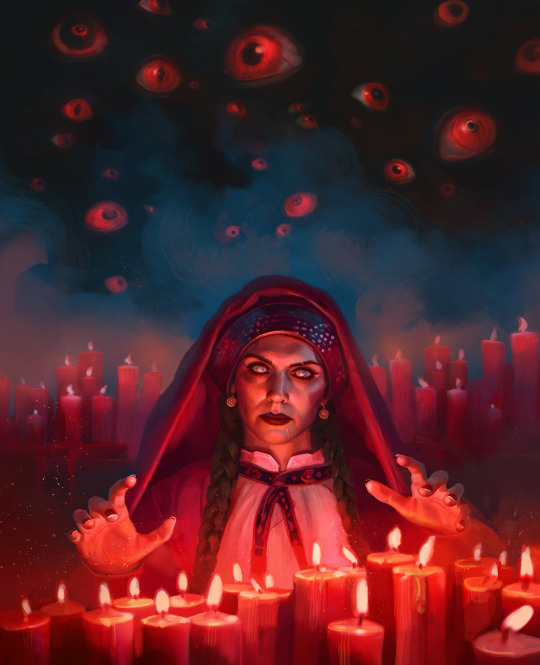
Happy to be commissioned a few months back to paint this cover for author Andrea Manfredini with his new book ''The Thousand Eyes of the Night''; A story about a Balkan witch with magic, folklore and scheming.
The briefing was very exciting to work with, and the color scheme just as so.
Love to know your thoughts!
Best,
JCH
#dungeons and dragons#board games#concept art#fantasy art#tabletop games#digital painting#magic the gathering#character design#ancient history#armor#balkan#slavic mythology#slavic folklore#occult#wicca#witch#dark art#horror#horror movies#fantasy book cover
101 notes
·
View notes
Text
Second OC (Original Character): Lady Halatirnë II
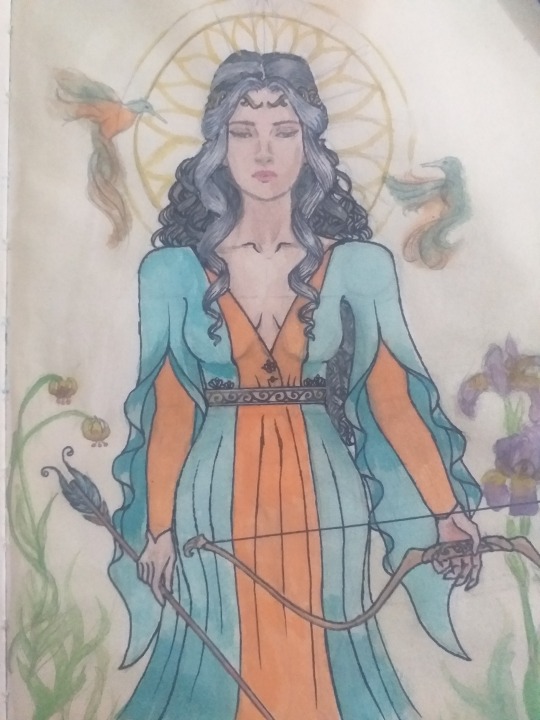
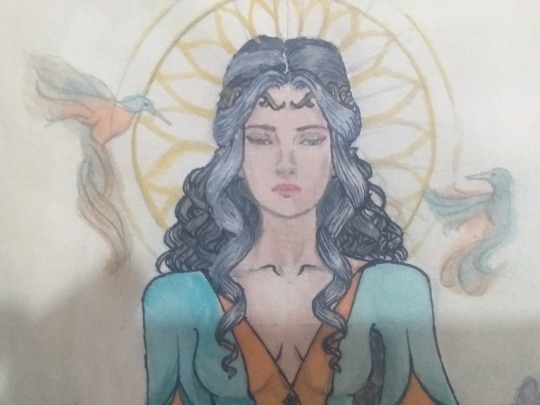
Halatirnë was the Fairest
Among the women of all ages
A radiant huntress, noble lady,
And a current scion of the Eternal Flower Family.
Her existence mirrored Lúthien's wit and grace,
And surpassed the beauty of Helen, the Trojan Princess.
She inherited the unusual Elven skills
That remained undescribed by the tongue of the Mortals.
A waist-length wavy hair streamed behind her
Was as dark as black with the strands of silver,
Her eyes were silvery grey like the pools of starlight
Captivated the hearts of many who crossed her path.
Her skin was fair and bright as porcelain
Adorned with the hues of yellow-golden,
Don her teal blue and orange dress
Embroidered with the blossoms of watercress.
Halatirnë II Aiarlote (or Heledirwen II Aearlóth) was the eldest daughter of Lord Eärsarno and Nemmíriel Oiolótë, wife of Lord Hrávahyalmo Altaluimë (upcoming OC) and Count Šimun Mitrović and mother of Aiardil Alatarāto (First OC) and Aiarnāro Elnethīnye (Amilessë of Marko Stjepan Mitrović). Her brief backstory and appearance were mentioned in "The Long Ballad of Eärendil—The Post-Tolkien Legendarium Non-canon Story" (Ongoing). click the link above
In my artwork, Halatirnë was surrounded by the two endemic floras found in the Balkan Mainland—Lilium Bosniacum (Desno/right) was the emblematic flower of Bosnia and Herzegovina and the medieval Kraljevina Bosna (Kingdom of Bosnia) while Iris Croatica (Lijevo/Left) was the National Flower of Republika Hrvatska (Republic of Croatia). And also, a pair of Kingfishers flying around her.
Name(s):
The cilmessë "Halatirnë" was derived from Quenya: Halatir "Kingfisher". Her Ataressë was Sérmahtarë (Quenya: "Peace warrior") and Amilessë was Aiarindile/Aiarlóte (Telerin: Sea Lily/Sea Flower).
#books#non canon#tolkien legendarium#wattpad#wizarding world#poem#artwork#reading#elemmírë#eärendil#The long ballad of eärendil#oc art#my ocs#original character#watercolour art#watercolor painting#I use my black pen for my ultimate sketch step#headcanon#balkan#The story is very Balkanized#The story was set in Croatia Bosnia or somewhere#This character is a Balkan citizen but a pure Elven#sea elves#teleri#The Silm rip-off#The Balkanized Rip-off of the Silm#Basically one of the trashy Spin-offs of the Balkan Silmarillion
3 notes
·
View notes
Text
If you bawled your eyes out at Hachiko perhaps you are not ready for Argos 😭😭
Argos (a small analysis) + after note story
So we all know that Odysseus lost more than 600 of his shipmates in total (both at war but most of all to his fateful trip to return to Ithaca) but I believe we must talk more of one last loss Odysseus suffered and that was at his own home; the loss of probably his most loyal companion who recognized him unconditionally even under the spell of Athena; his loyal Dog Argos.
The Dog:
Argos was Odysseus's loyal hound. The dog has been identified by some other brilliant Tumblr writers such as @pelideswhore as a Greek/Hellenic Hare Hound:

A midium-sized ancient dog breed that has been used for millennias in Greece (and after the spread of hellenic culture by the colonies and Alexander the Great etc in most Balkans) as a hound and a tracking dog. These dogs are known for their exceeding loyalty, playful energetic temperament and unique personality.
In the Odyssey:
Argos appears only once in the Odyssey (Hom.17) and that is when Odysseus enters the gates of the palace he notices an old dog covered in flees and parasites at the gates of the palace. The recognition is mutual and immediate. Argos who waited for more than 20 years for his master who raised him from puppy no longer has the strength to move but slowly pushes his ears back and wags his tail softly. Odysseus on the other hand feels his eyes tear up and yet he has to wipe them and hide himself so Eymeus won't recognize him. He has to pretend again that he doesn't know and he has to walk past his most loyal friend. Argos on the other hand just leans back and dies on the spot for he has now the delight of seeing his master back home and now he can die in peace...
We get very little information on Argos story but we know that Odysseus raised him from pup but he didn't have much time to have joy with him ("ουδ' απόνητο" = he didn't use him, he didn't hunt with him) but Eumeus mentions how there was no quicker dog in hunting so in a way Argos at some point did hunt with the younger generation but eventually probably the dog grew older and more and more depressed. When Odysseus was pronounced dead by many the slave women neglected him and bore no respect for him anymore and so Argos withers away but keeps waiting for his master.
Interestingly the term of "use" here is απόνητο which seems to have the hidden essence of "pain" since πόνος stands for "pain" in Greek. So in a way the ουδ' απόνητο might as well have the hidden meaning "not without pain". In a way the dog is not without pain if anything his pain seems to reflect his master.
The name:
In regards to the name "Argos" stands for "swift" or "quick" in homeric Greek (which could be indicative on the dog's speed) but as some people tend to suggest in their headcannons it seems to be an indirect mention of "Argo" the legendary ship that went for the Golden Fleece. Odysseus is linked to the ship in more than one way;
According to some versions, his father Laërtes was one of the men who took part to the legendary quest as an Argonaut
One other member of the Argonauts was the legendary Heracles who, according to some myths, was linked to his grandfather, Autolycus who taught him how to wrestle.
Quite frankly both versions seem possible or if anything they are not mutually exclusive. Maybe the dog's swiftness was also a reason for Odysseus to link him to that ship.
The tragic importance of Argos:
The scene is probably the last death linked to Odysseus and the last death to affect him. Argos is also the first actual living proof that Odysseus gets for the consequences of the passage of time in such a brutal way. Yes he did see Eumeus and heard his tragic story but Argos is basically giving Odysseus the perspective of time; for him 20 years were a lifetime but for his dog it was double as such.
Odysseus faced someone who by perspective endured longer than what he did.
The death is also the slowest and most tragic he had to face; his comrades died violently and swiftly. Argos was there. Odysseus had the chance to say goodbye at least to ONE FRIEND before death and at that moment he was unable to. He had to pretend he didn't know him and he could not say goodbye to him. And yet Argos DIDN'T CARE!
To Argos it didn't matter that Odysseus had to pretend he didn't know him. He was unconditionally happy to see him again, so much that he totally just finally allowed himself to die after finishing his duty and greeting his master back home.
The ending of his life is also described abruptly and simply by Homer

"But alas, Argos received the fate of black death the moment he saw Odysseus upon the 20th year" aka "Death claimed Argos the moment he saw Odysseus again after 20 years). In a way the dog's death is the opposite of his life (his life was long and tormented but his end was swift, simple, happy and sweet)
Argos is an excellent parallel with Telemachus too in order to show how the heart is the one who recognized Odysseus and not eyes or mind. Argos knew Odysseus more than Telemachus due to the fact that he was raised by him but Argos didn't spend so much time with him either and yet he recognized him and welcomed him even under the disguise. Telemachus's first instict was that his brain doubted when he saw his father without a disguise before he was convinced. Argos knew...he always knew.
Odysseus was recognized for the last time by someone else before entering the palace as a beggar aka as a nobody again as someone without identity until he was recognized again by his old nurse.
Argos is in a way a parallel to Anticlea. Anticlea withered and died by waiting. Argos seemed to have gained strength by hope to see his master again for he endured for a life that was already almost double than most dogs and also this death Odysseus was on time to witness. Unlike Anticlea who died before Odysseus could be there in her final moments, he was there for Argos
Argos is yet another death that Odysseus was not allowed by circumstances to mourn.
A tribute to Argos
Odysseus walked slowly outside the door of the palace. After the day he finally spent to his home and the preparation of everything to visit his old father Laërtes, he knew there was something else he had to do...something he believed he owed to a friend. His heart clenched as he walked out of the walls. His sad smile failed. There was nothing there.
That spot he was staring now was the last resting place of one of his friends he never thought to see again; his loyal Argos. Argos had waited for him for two decades; more than double his lifetime and Odysseus couldn't even hug him one last time; If only he could! Even if he was covered in flees. Even if the dog was in terrible condition...he deserved it. And yet he couldn't.
However now there was nothing there.
Odysseus sighed. He had expected that. He had spent at least two days in the palace before he got his revenge. Who would have left a dead dog out there for so long? Odysseus was prepared to face the terrible sight of a corpse full of maggots and flies but apparently he was spared that last horror. He was both sad and grateful for that.
He fell to his knees and touched the spot where the loyal dog met his end and finally he let his tears fall for one last time for real this time.
"Forgive me, boy..." he whispered, "you waited so long..."
He wiped away his tears and forced a sad smile on his lips.
"We could have done so much together, my friend...alas fate had other plans... Perhaps we will get our chance in another life...maybe we can hunt together in the underworld..."
He placed a small lily flower and an olive branch from the tree in his room to the spot. He then left there a dried apricot; it was Argos's favorite snack he remembered.
"Forgive me my boy...you will have to wait for a bit longer...perhaps... Perhaps I will see you waiting for me when Argophontes brings me down the bitter river as a dead soul..."
He heard someone calling him. Yes, it was about time to go and pay his respects to the last person waiting for him...
He stood back to his feet
He slowly walked away.
#odysseus#greek mythology#the odyssey#odyssey#Argos#argos the loyal dog#odysseus and argos#homer#homeric poems#homeric epics#tagamemnon#angst#loyalty#loyal dog
24 notes
·
View notes
Text
Just so stories: a trip to Jerusalem
I find the last FACT based scenario very schematic, to be honest. It heavily relies on the idea of 'being seen' somewhere/anywhere and S knows exactly what that particular troll's audience wants. What it wants is not precision and timelines, nor simple logic or consistency. What it wants is just a good, old Juicy Lucy Ficburger.
By now, the number of Ships that Never Sailed reached the size of a Balkan country fleet.
I also happen to think it is that particular Mordor crowd/fringe's turn to be engaged with by PR, after we've had all that unexpected shippery content thrown at us in Oz.
Musical Chairs seems to be the name of this PR game. Engage every faction, sometimes even simultaneously, but always leave out some critical details, which would make the presented story 100% watertight.
We know how this game ends. Really, it's like that Highlander story: there can be only one. Question is how many will have the energy to follow up to that point?
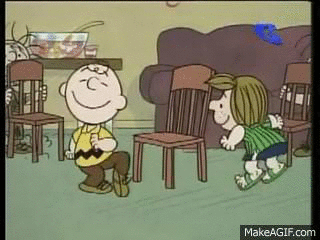
45 notes
·
View notes
Note
what was that about gil having dreams about the future? (no pressure!)
Oh anon my beloved thank you so much; I dropped that little tidbit into that post hoping someone would ask about it
The truth is that while it is a strongly held headcanon of mine, it’s something of half a historical in-joke, and half a metanarrative indulgence. I’ll cover both of these respectively, in case you want just the historical reasoning and not so much my deranged meta-analysis on nations, narrative, and metanarrative. With this in mind;
Prussia as Cassandra, A Meta
A brief historical overview
The Old Prussians practiced omen-reading and regarded seers with high regard, which was acknowledged as valid by the Teutonic Knights (when the omens predicted victory in battle, at least) and was practised by both men and women
White Ladies are supposedly ghosts of women who haunt the Hohenzollern family as omens of misfortune and especially as messengers of coming death. Notably, Queen Sophia Louise was once afflicted by a bout of madness in 1709 and dressed only in her white nightgown and having cut herself on some broken glass and screamed at King Frederick I (grandfather of Fritz) that "the plague would devour the king of Babylon". In part due to the White Lady folklore, he took this with serious regard and proceeded to prepare Berlin against the upcoming plague (which very much devastated wide swathes of both Prussia and the rest of Northern Europe)
Bismarck very probably never actually said the famous "damned foolish thing in the Balkans" quote that people like to trot out about the inevitability of World War 1 so I hesitate to include it here as historical fact, but for the purposes of elaborating on the "historical in-joke" half of this meta I will gesture to it as a vague suggestion of an ironic future-vision that, as I will discuss shortly, I think makes a certain degree of narrative sense.
Now, moving on to the narrative background and arguably the meat of this meta:
Narrative analysis
Entire books could and have been written about the depiction of history, and the fictionalisation of history for the purposes of narrative storytelling, especially in regards to the personification of abstract concepts like nation-states and their associated concepts. Unfortunately I cannot afford to go to university so you are getting this post instead.
For the purposes of this discussion strict literal academic historicity is not our goal, but rather HWS Prussia as a narrative construct within the sandbox of Hetalia as a story that involves and adapts history but is not necessarily directly representative of it.
Within this frame of analysis, Prussia as a character is a distinctly weird choice for Himaruya to make: To establish him as an ongoing, extant entity in the modern day is definitely A Narrative Choice to make, and honestly not really one I could personally imagine making. Perhaps it's a lingering result of questionable initial research, perhaps there's some meat to chew on in regards to this.
Prussia's design is one that stands out, compared to the rest of the mostly-naturalistic cast. We have the initial design concept for him depicting him as an older, rugged man, and we also have his very early canon design that depicts him with blond hair and blue eyes. However, the decision was made at some point relatively early on to change his design to be distinctly and notably Not Natural: Some debate has been made about to what degree is he actually albino, but the design is still notable for being distinctly 'set apart' from the other nations.
From there, we have to start asking questions about why this decision was made. My personal first thought was perhaps it was inherently tied to his creation as an "unnatural" state in the form of the Teutonic Knights. Voltaire's popular quote about Prussia not being a nation with an army, but rather an army with a nation might come to mind. However, we have been provided with the designs of the other Orders and they don't share his design traits in favour of their own design language, meaning that line of question falls short.
From there, I think it's not unreasonable to suggest that Prussia was designed - in his final, canon form - with his dissolution in mind. It sets him apart visibly from the rest of the established nations, and fundamentally Others him from the rest of the cast - a similar design concept used with Russia, who is within the canon framework of Hetalia, heavily associated with the sinister supernatural as signaled by his unnaturally coloured eyes.
Therefore, on a narrative level, Prussia's appearance foreshadows his own death, and his death was inevitable from the very beginning.
(Turns out the Calvinists were right, huh?)
With all that in mind, I don't find it unreasonable to take that dramatic narrative irony and apply that inherent 'friction' to the rest of Prussia's story: His narrative is haunted by his own death.
By virtue of his creation and his design (and within the framework of the text, his existence) he is doomed to die, and that singular event ripples back through his narrative almost like a psychic shockwave. Everything he Is points towards The End.
When that End comes, it 'releases' a good deal of that narrative tension. Himaruya has said that he designed Prussia to be something of a villainous character and the dissolution provides the suitable narrative endpoint in that regard. However.
The narrative framework of Hetalia continues, as the history it adapts tends to do, which begins to create a new form of narrative tension due to The Decision to have Prussia continue existing into the 'modern' setting. Himaruya has been incredibly cagey about this and besides the ongoing mystery of The HRE Situation the topic of Prussia's ongoing existence is something he's been noticeably coy about in his discussions and implications of East Germany and the following Reunification, but that's an entirely separate essay from what this one is about.
Fundamentally, I think that Prussia - as a narrative construct - is inherently and on a foundational level tied to his own eventual nonexistence, and the dramatic tension of What Comes After. I think he knows, on some primal, unfathomable level, and rages against it right up until it comes for him and he has to learn how to pick up the pieces of himself, his legacy, and his own narrative.
With that intrinsic narrative irony in mind, I don’t think it is too out there to suggest that he possibly (unintentionally, unconsciously) channels the future-sight that keeps cropping up in Prussian history, as noted above. At least in some form, I think he resonates with the coming End in a way that he cannot fully comprehend or articulate and like the Cassandra of myth there is nothing he can do to warn about or avert the doom that he sees and senses.
Troy could not be saved, and neither can he.
But that's just a theory. A game theor—
If you’ve made it this far, thank you so much for reading! This really got away from me and I really do hope that it's at least somewhat comprehensible.
27 notes
·
View notes
Text
What a year, huh? We all know I have to be emotional on tumblr.com whenever the opportunity arises because that's one way I allow myself to have an emotional catharsis (for legal reasons this a joke)
In all seriousness though, this year has been a lot for me. Both in a good and bad sense, but Käärijä and Joker Out improved it significantly. And more importantly, their fandoms. (More inder the cut bc this is long af)
I have never really been someone who knows anything about the artists' whose music I listened to. Before this, I don't think I ever listened to a full album of someone, just random songs that I liked. Finding stuff from personal life of bands/musicians I liked usually made me depressed so I didn't bother.
Then, ESC 2023. happened. I frankly have no idea what flipped the switch in my head. Bojere interactions? The way people on tumblr were so welcoming even back when I was mostly posting about Let 3 and Käärijä only? I don't know, I only know that we are here now, regardless.
Another thing about me is that I used to be very pessimistic person. Likez genuinely. I have been "unofficially"(long story) diagnosed with depression and anxiety since I was 11, which is over a decade now. I always had a lot of bad experiences with people and really awful trust issues. I have been doing better for some time now, but it is very hard to let go of the feeling of pessimism and helplessness. In a world where awful things happen every second, what can I possibly do that would change anything?
Then ESC happened. Käärijä lost and I thought "another injustice that will never be corrected". Except, instead of feeling defeated, everyone just loved him more. In those weeks after and later on months, all I have seen had been unrelenting love and acceptance of Jere. Reminding him that despite not winning Eurovision, he is our winner and we'll forever think of him as such. Jere who has a wonderfully belly and strong thighs and is short and by no means is he conventional in any sense. And people loved him not despite all that but because all that. Because we all found ways to relate to him, or to what he went through.
His story of almost dying and still getting where he did only served to highlight that more. Because of he did it, why can't we get to what we want? Why can't I? It shifted my whole perspective.
Then, Joker Out. It is so, so funny to me how I barely paid any attention to them during ESC, except for bojere interactions and was dragged in it by the shared fandom, when now I post most about them.
But yes, JO. A band from Slovenia that while tehnically isn't Balkan, felt so close to me. Like they could understand all the things I kept to myself because of where I was. And then they showed me there is still hope.
I have never seen a band from around here take a pride flag on the stage. Never. I know it's a thing, especially abroad, but God I have never seen that happen here. And with how much love they always took it! That's...wow. It gave me hope that not only is it possible for injustices to be corrected, but that ot's possible to do it even in the environment I'm in.
And then...the Virtual Letters Project happened. Or well positive confessions that @spockowhales turned into Virtual Letters Project.
That's when I knew it's truly possible. I have seen tumblr posts, yes. But getting stuff so directly addressed about or to JO made me realize how much of a "wave" they all created. So many people said they helped them with their depression, with viewing their world differentky with meeting new peoplez with daring to do something new.
I have no words to describe how much that meant to me and I really hope that when they read those letters, they understood the impact they had.
But even that aside, I want to thank everyone in this fandom. People I have talked to, people I have interacted with it any way, through replies, reblogs, likes, anon asks. I appreciate every single one of you for helping create such a wonderful space. We had our ups and downs in the fandom, but we are all here because we love these fandoms, these people so much to keep talking about it even months after.
Thank you and I wish everyone here a wonderful New Year with even more laugh, love and positivity ❤️ have a good one
#rio rambles#käärijä#joker out#man this is so long but I couldn't stop myself#rio writes a love letter to jere JO and the fandom in general I guess lmao
32 notes
·
View notes